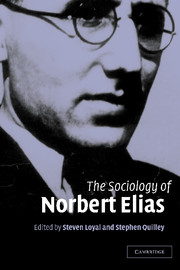Book contents
- Frontmatter
- Contents
- List of contributors
- Acknowledgements
- 1 Towards a ‘central theory’: the scope and relevance of the sociology of Norbert Elias
- Part I Sociology as a human science: Norbert Elias and the sociology of knowledge
- 2 From distance to detachment: knowledge and self-knowledge in Elias's theory of involvement and detachment
- 3 Ecology, ‘human nature’ and civilizing processes: biology and sociology in the work of Norbert Elias
- 4 Between the real and the reified: Elias on time
- Part II Processes of stratification: figurations of race, class and gender
- Part III The formation of individuals and states
- Part IV Religion and civilizing processes: Weber and Elias compared
- Index
- References
3 - Ecology, ‘human nature’ and civilizing processes: biology and sociology in the work of Norbert Elias
Published online by Cambridge University Press: 22 September 2009
- Frontmatter
- Contents
- List of contributors
- Acknowledgements
- 1 Towards a ‘central theory’: the scope and relevance of the sociology of Norbert Elias
- Part I Sociology as a human science: Norbert Elias and the sociology of knowledge
- 2 From distance to detachment: knowledge and self-knowledge in Elias's theory of involvement and detachment
- 3 Ecology, ‘human nature’ and civilizing processes: biology and sociology in the work of Norbert Elias
- 4 Between the real and the reified: Elias on time
- Part II Processes of stratification: figurations of race, class and gender
- Part III The formation of individuals and states
- Part IV Religion and civilizing processes: Weber and Elias compared
- Index
- References
Summary
Introduction
One of the great strengths of Norbert Elias's work is that he sought to develop sociology as a rigorous science of society. He argued that the scientific investigation of social processes, although at an early stage of development, could be potentially as rigorous and as open to generalization as any of the natural sciences. ‘The structure of a given system of rules, as a figuration of interdependent people, can be determined with almost the same rigour as that of a specific molecule by a scientist’ (1983: 119). This was also one of the reasons for the slow appreciation of his work in the anglophone world. Since the 1970s wider awareness of substantive studies such as The Civilizing Process and The Court Society has not led to a revival of interest in the more programmatic and epistemological works such as Involvement and Detachment. One reason for this was the intellectual ascendance, in recent decades, of epistemological relativism in a variety of forms (poststructuralism, postmodernism, the ‘linguistic turn’, discourse analysis etc.) and a pronounced retreat from any scientific ambitions for sociology. This has also been combined with a deep scepticism of any theories of long-term development, which became associated with unfashionable Marxist teleology and Eurocentric progress theory. Another consequence of this new sociological ‘common sense’ was the rigid codification of what Pinker cruelly, if in part accurately, caricatures as commitment to the ‘blank slate – the modern denial of human nature’ (Pinker 2002).
- Type
- Chapter
- Information
- The Sociology of Norbert Elias , pp. 42 - 58Publisher: Cambridge University PressPrint publication year: 2004
References
- 9
- Cited by



